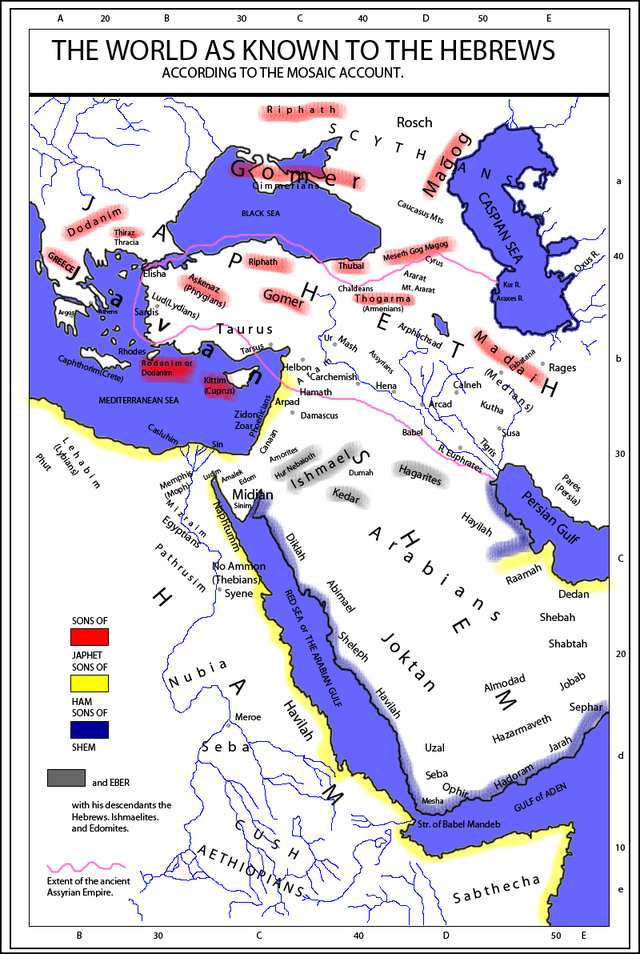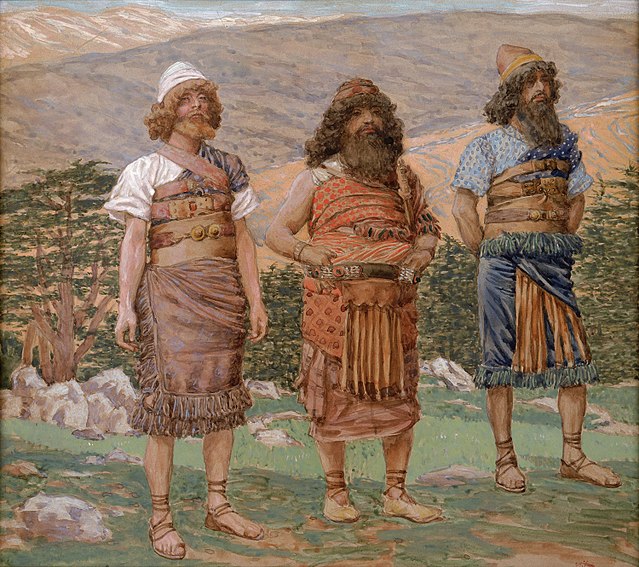Loading AI tools
Biblical figure, son of Noah From Wikipedia, the free encyclopedia
Japheth /ˈdʒeɪfɛθ/ (Hebrew: יֶפֶת Yép̄eṯ, in pausa יָפֶת Yā́p̄eṯ; Greek: Ἰάφεθ Iápheth; Latin: Iafeth, Iapheth, Iaphethus, Iapetus; Arabic: يافث Yāfith) is one of the three sons of Noah in the Book of Genesis, in which he plays a role in the story of Noah's drunkenness and the curse of Ham, and subsequently in the Table of Nations as the ancestor of the peoples of the Aegean Sea, Anatolia, Caucasus, Greece, and elsewhere in Eurasia.[1] In medieval and early modern European tradition he was considered to be the progenitor of the European peoples.[2][3][4]
The meaning of the name Japheth (יפת: y-p-t) is disputable. There are two possible sources to the meaning of the name:[5]

Japheth first appears in the Hebrew Bible as one of the three sons of Noah, saved from the Flood through the Ark.[5] In the Book of Genesis, they are always in the order "Shem, Ham, and Japheth" when all three are listed.[6][7] Genesis 9:24 calls Ham the youngest,[7] and Genesis 10:21 refers ambiguously to Shem as "brother of Japheth the elder", which could mean that either is the eldest.[8] Most modern writers accept Shem–Ham–Japheth as reflecting their birth order, but this is not always the case: Moses and Rachel also appear at the head of such lists despite explicit descriptions of them as younger siblings.[9] However, Japheth is considered to have been the eldest son of Noah in Rabbinic literature.[5]
Following the Flood, Japheth is featured in the story of Noah's drunkenness.[5] Ham sees Noah drunk and naked in his tent and tells his brothers, who then cover their father with a cloak while avoiding the sight; when Noah awakes he curses Canaan, the son of Ham, and blesses Shem and Japheth:[5] "Blessed be the Lord God of Shem and may Canaan be his slave; and may God enlarge Japheth and may he dwell in the tents of Shem, and may Canaan be his slave!"[10] Chapter 10 of Genesis, the Table of Nations, describes how earth was populated by the sons of Noah following the Flood, beginning with the descendants of Japheth:
| Japheth | |||||||||||||||||||||||||||||||||||||||||||||||||||||||||
| Gomer | Magog | Madai | Javan | Tubal | Meshech | Tiras | |||||||||||||||||||||||||||||||||||||||||||||||||||
| Ashkenaz | Riphath | Togarmah | Elishah | Tarshish | Kittim | Dodanim | |||||||||||||||||||||||||||||||||||||||||||||||||||

Japheth (in Hebrew: Yā́p̄eṯ or Yép̄eṯ) may be a transliteration of the Greek Iapetos, the ancestor of the Hellenic peoples.[11][12] His sons and grandsons associate him with the geographic area comprising the Aegean Sea, Greece, the Caucasus, and Anatolia: Ionia/Javan, Rhodes/Rodanim, Cyprus/Kittim, and other places in the Eastern Mediterranean region.[12][13] The point of the "blessing of Japheth" seems to be that Japheth (a Greek-descended people) and Shem (the Israelites) would rule jointly over Canaan (Palestine).
From the 19th century until the late 20th century, it was usual to see Japheth as a reference to the Philistines, who shared dominion over Canaan during the pre-monarchic and early monarchic period of Israel and Judah.[14] This view accorded with the understanding of the origin of the Book of Genesis, which was seen as having been composed in stages beginning with the time of King Solomon, when the Philistines still existed (they vanished from history after the Assyrian conquest of Canaan). However, Genesis 10:14 identifies their ancestor as Ham rather than Japheth.[11]

In the Hebrew Bible, Japheth is ascribed seven sons: Gomer, Magog, Tiras, Javan, Meshech, Tubal, and Madai. According to the Roman–Jewish historian Flavius Josephus in Antiquities of the Jews, I.VI.122 (Whiston):
Japhet, the son of Noah, had seven sons: they inhabited so, that, beginning at the mountains Taurus and Amanus, they proceeded along Asia, as far as the river Tanais (Don), and along Europe to Cadiz; and settling themselves on the lands which they light upon, which none had inhabited before, they called the nations by their own names.
The Sefer haYashar ("Book of Jasher"), written by Talmudic rabbis in the 17th century, attributed some new names for Japheth's grandchildren which are not found in the Hebrew Bible, and provided a much more detailed genealogy. In the Jewish tradition, Abraham's wife Keturah is sometimes considered a descendant of Japheth.[15]


In the 7th century AD, Hispano–Roman archbishop and scholar Isidore of Seville wrote his noted encyclopedic-historical treatise titled Etymologiae, in which he traces the origins of most of the European peoples back to Japheth.[16][17] Scholars in almost every European nation continued to repeat and develop Isidore of Seville's assertion of descent from Noah through Japheth into the 19th century.[4]
William Shakespeare's play Henry IV, Part II contains a wry comment about people who claim to be related to royal families. Prince Hal notes of such people,
...they will be kin to us, or they will fetch it from Japhet. (II.ii 117-18)
The Georgian historian and linguist Ivane Javakhishvili associated Japheth's sons with certain ancient tribes, called Tubals (Tabals, in Greek: Tibarenoi) and Meshechs (Meshekhs/Mosokhs, in Greek: Moschoi), who claimed to represent non-Indo-European and non-Semitic, possibly "Proto-Iberian" tribes that inhabitated Anatolia during the 3rd-1st millennia BC.[3]
In the Polish tradition of Sarmatism, the Sarmatians, an Iranic people, were said to be descended from Japheth, son of Noah, enabling the Polish nobility to believe that their ancestry could be traced directly to Noah.[4] In Scotland, histories tracing the Scottish people to Japheth were published as late as George Chalmers's well-received Caledonia, published in 3 volumes from 1807 to 1824.[18]
Japheth (in Arabic: Yāfith)[19] is not mentioned by name in the Quran but is referred to indirectly in the narrative of Noah (Quran 7:64, 10:73, 11:40, 23:27, 26:119).[19] Muslim exegesis of the Quran, however, names all of Noah's sons, and these include Japheth.[20] In identifying Japheth's descendants, Muslim exegesis mostly agrees with the Biblical tradition.[21]
In the Islamic tradition, he is usually regarded as the ancestor of the Gog and Magog tribes. Islamic tradition also tends to identify the descendants of Japheth as including the Turks, Khazars, Chinese, Mongols, and Slavs.[19][22] According to Abū'l-Ghāzī who wrote the 17th-century ethnographic treatise Shajara-i Tarākima ("Genealogy of the Turkmen"), the descendants of Ham went to Africa, Shem to Iran, and Japheth went to the banks of the Itil and Yaik rivers, and had eight sons named Turk, Khazar, Saqlab, Rus, Ming, Chin, Kemeri, and Tarikh. As Japheth was dying he established Turk, his firstborn son, as his successor.[citation needed]
According to the 18th-century Hui Muslim writer Liu Zhi, after Noah's flood, Japheth inherited China as the eastern portion of the Earth, while Shem inherited Arabia as the middle portion, and Ham inherited Europe as the western portion.[22] Some Muslim traditions narrated that 36 languages of the world could be traced back to Japheth.[19]
Japheth is a major character in the second act of Stephen Schwartz's musical, Children of Eden. In this rendition, Japheth has fallen in love with the family servant, Yonah (created entirely for the show). He wants to bring her onto the ark to allow her to survive the flood, but Noah forbids this as Father (God) is trying to wipe the world free of those descended from Cain. Yonah is descended from Cain, despite her good heart and love from the family. Japheth secretly brings her aboard, and she is eventually discovered by Ham and Shem. Japheth defends her from Noah and is about to kill Shem in his rage. Yonah stops and calms him, and Noah decides to let her stay. The flood passes and the brothers all depart for different regions to populate the world, but Japheth and Yonah decide they want to search for Eden. Noah blesses their journey by passing the staff of Adam to Japheth. Smaller casts of the show usually have the actor who portrays Cain to also portray Japheth.
Seamless Wikipedia browsing. On steroids.
Every time you click a link to Wikipedia, Wiktionary or Wikiquote in your browser's search results, it will show the modern Wikiwand interface.
Wikiwand extension is a five stars, simple, with minimum permission required to keep your browsing private, safe and transparent.